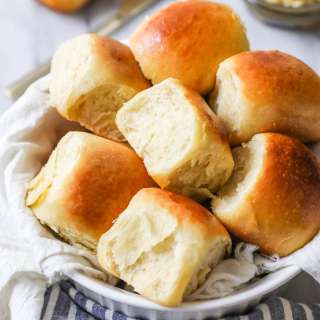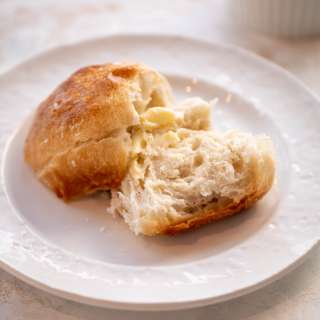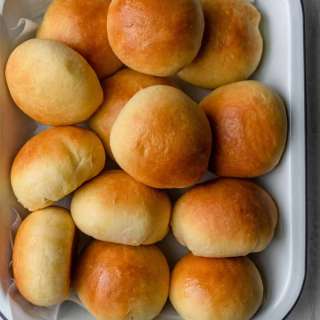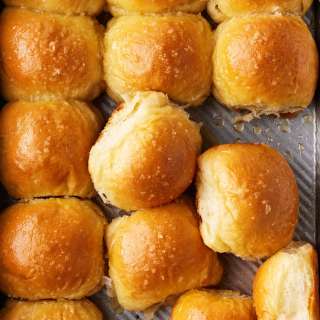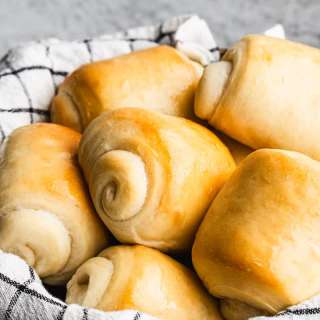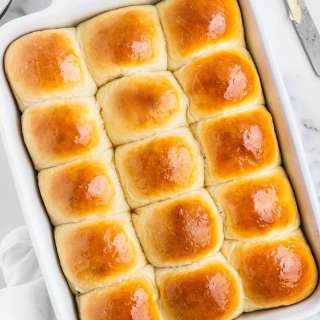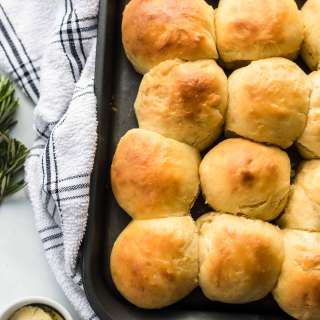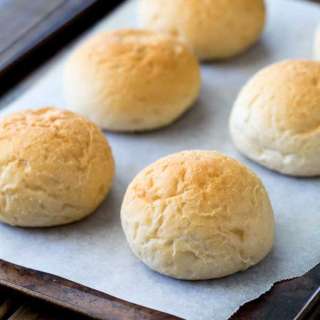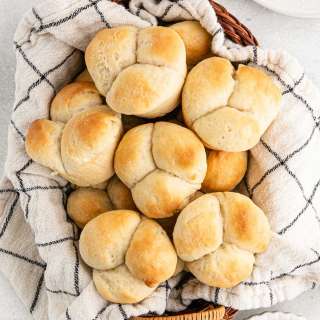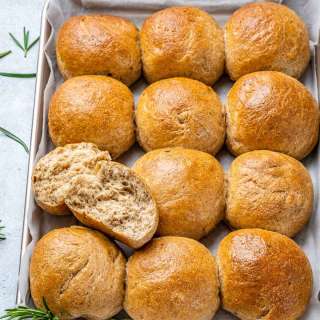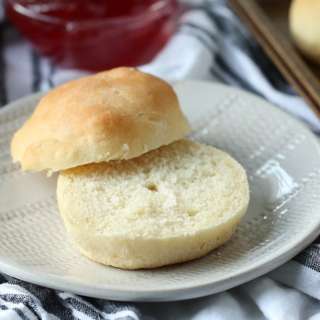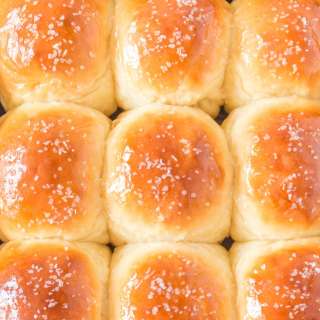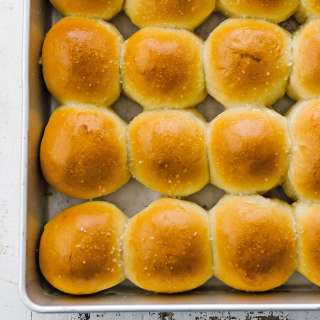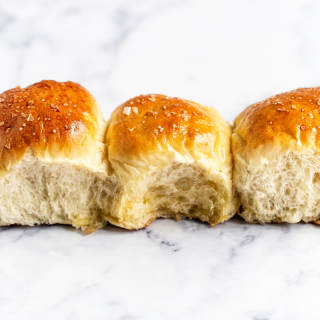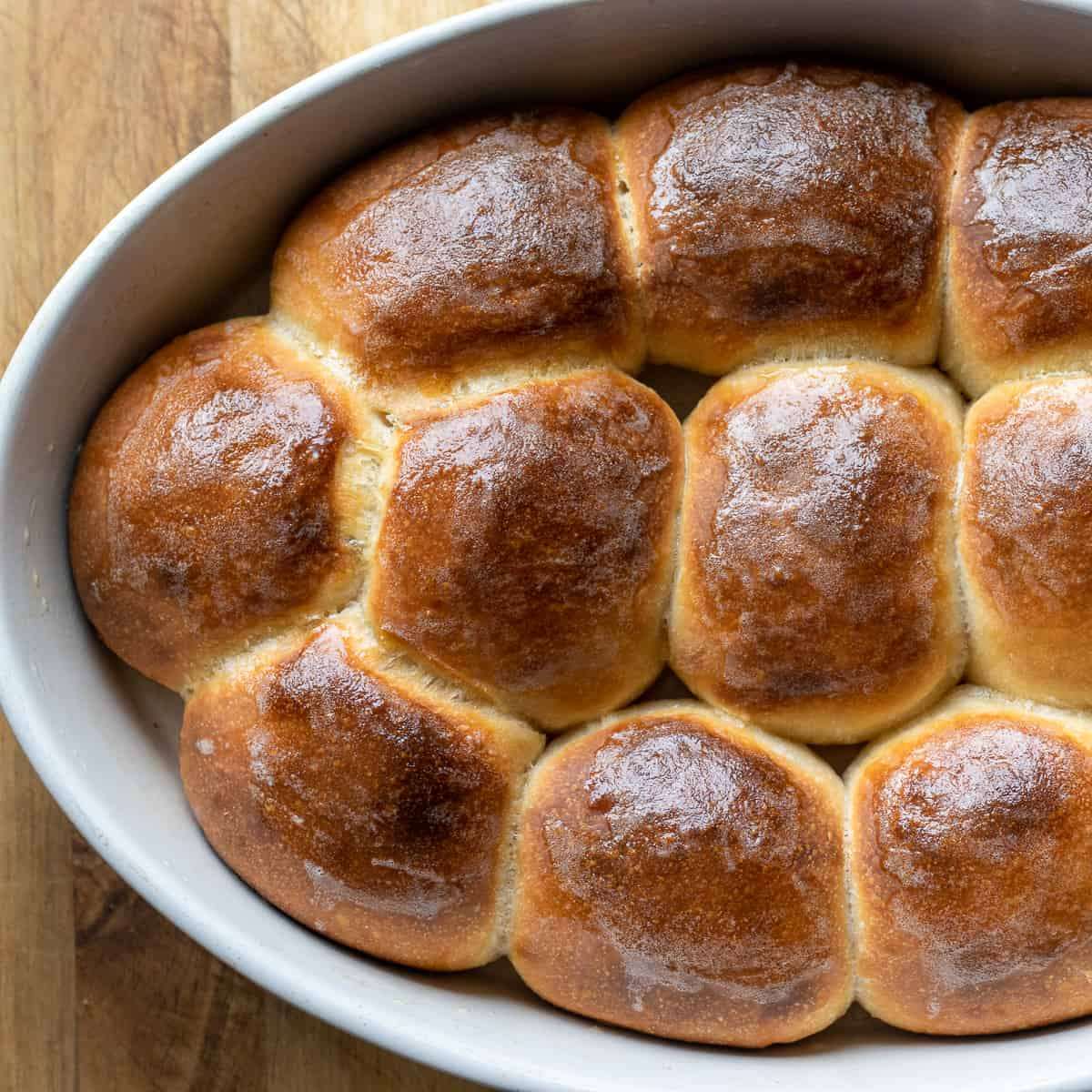
Homemade Sourdough Dinner Rolls
User Reviews
5.0
3 reviews
Excellent

Homemade Sourdough Dinner Rolls
Report
Nothing beats the smell of freshly baked bread, especially when it's Sourdough Dinner Rolls. They are the ultimate comfort food and a great addition to any meal.
Share:
Ingredients
- 100 g active sourdough starter
- 375 g strong white flour
- 240 ml milk (lukewarm)
- 1 teaspoon salt
- 15 g honey
- 30 g melted butter (for the dough)
- 1 tablespoon melted butter (for brushing baked dinner rolls)
Instructions
Mixing the Dough
- To get your sourdough starter ready for Homemade Sourdough Dinner Rolls, activate it 12 hours before you plan to start making the recipe.
- Combine 20 grams of sourdough starter with 80 grams of water and 80 grams of strong white flour.
- Place a lid or cling film over it and keep it in a warm area for 12 hours or until you are prepared to use it.
- Take a large mixing bowl and mix together the active sourdough starter, flour, milk, honey, salt, and melted butter.
- Mix until there are no dry spots.
- Then, turn the dough out onto a floured surface and knead it for several minutes until it becomes smooth and elastic.
- Cover the bowl with a tea towel and leave it to rest for 1 hour.
- If you like, you have the option to use a stand mixer for kneading.
- To do so, place the active sourdough starter, flour, warm milk, honey, salt, and melted butter into the bowl of a stand mixer fitted with a dough hook.
- Knead the mixture at medium speed for approximately 6-7 minutes until the dough begins to come away from the sides of the bowl.
- Cover the bowl with a tea towel and leave it to rest for 1 hour.
Stretching and Folding
- After the dough has rested for 1 hour, it's time to use the stretch-and-fold method. This method helps the gluten develop, which is what gives sourdough bread its signature chewy texture.
- To do the stretch-and-fold method, wet your hands and grab the dough from the bottom of the bowl.
- Stretch it upwards and fold it over itself. Rotate the bowl a quarter turn and repeat the process. Do this four times, so you've done a full rotation.
- Cover the bowl with a tea towel and let it rest for 30 minutes.
- Repeat the stretch-and-fold method three more times, with 30-minute rests in between each round.
- The dough should feel lighter and puffier and have increased in size by approximately 40%.
Proofing the Dough (Bulk Fermentation)
- After the last stretch-and-fold, cover the dough with a kitchen towel and allow it to rise in a warm spot
- If the temperature is warm enough, 2 to 3 hours may be sufficient (or possibly less), but allow more time for fermentation if it's colder.
- To achieve the best results, keep an eye on the dough's progress rather than relying solely on the clock.
- You can make the bulk fermentation overnight if you prefer. To do so, simply cover the bowl with a cloth or cling film and place it in the refrigerator for overnight fridge-proofing.
- Transfer the dough onto a floured work surface, ensuring to remove it from the bowl.
- If it has been kept in the refrigerator overnight, allow it to rest at room temperature for 20 minutes before shaping.
Shaping the Dinner Rolls
- Divide the dough into 12 equal-sized balls (approximately 65 grams each), using a scale to ensure they all are the same size.
- Take each piece and bring all of the edges towards the center to create a compact ball.
- Flip the ball over so that the seam side is facing downwards. Using your palms, cup the dough ball and rotate it on the work surface to create surface tension. This will help the dough keep its shape during baking.
- If the dough feels sticky, use flour as needed to prevent it from sticking to your hands.
- Repeat the process for the remaining portions of dough until all the balls are shaped.
- Put the shaped rolls into a lightly greased baking dish of approximately 23cm x 23cm (9 inches x 9 inches) in size or equivalent.
- The rolls should be positioned so that they are lightly touching each other, but not too tightly packed.
- Cover the baking dish and let the sourdough rolls have their final proofing for 2-3 hours in a warm area until they have doubled in size.
Baking the Dinner Rolls
- While the dough is proofing, preheat your oven to 200℃ (390℉).
- Bake the rolls in the preheated oven for approximately 25 minutes, or until they have turned a deep golden brown.
- Once done, brush the tops of the warm dinner rolls with melted butter.
Equipments used:
Notes
- Use high-quality flour for the best results. Consider using bread flour, which has a higher protein content than all-purpose flour and can help give the rolls a chewy texture.
- Sourdough baking is all about precision, so it's important to measure your ingredients accurately. Using a digital scale is the best way to ensure that you're getting the right amount of flour, water, and starter.
- Ensure that your sourdough starter is active and healthy before starting the recipe. This will ensure that the dough rises properly.
- Sourdough needs time to rise, so don't be tempted to rush the process by increasing the temperature or adding more yeast. Let the dough rise at its own pace and you'll be rewarded with light and fluffy dinner rolls.
- While traditional sourdough is made with white flour, you can experiment with other types of flour to create different flavors and textures. Whole wheat, rye, and spelt are all great options to try.
Nutrition Information
Show Details
Calories
164kcal
(8%)
Carbohydrates
27g
(9%)
Protein
4g
(8%)
Fat
4g
(6%)
Saturated Fat
2g
(10%)
Polyunsaturated Fat
0.3g
Monounsaturated Fat
1g
Trans Fat
0.1g
Cholesterol
10mg
(3%)
Sodium
226mg
(9%)
Potassium
66mg
(2%)
Fiber
1g
(4%)
Sugar
2g
(4%)
Vitamin A
125IU
(3%)
Vitamin C
0.01mg
(0%)
Calcium
31mg
(3%)
Iron
1mg
(6%)
Nutrition Facts
Serving: 12rolls
Amount Per Serving
Calories 164 kcal
% Daily Value*
| Calories | 164kcal | 8% |
| Carbohydrates | 27g | 9% |
| Protein | 4g | 8% |
| Fat | 4g | 6% |
| Saturated Fat | 2g | 10% |
| Polyunsaturated Fat | 0.3g | 2% |
| Monounsaturated Fat | 1g | 5% |
| Trans Fat | 0.1g | 5% |
| Cholesterol | 10mg | 3% |
| Sodium | 226mg | 9% |
| Potassium | 66mg | 1% |
| Fiber | 1g | 4% |
| Sugar | 2g | 4% |
| Vitamin A | 125IU | 3% |
| Vitamin C | 0.01mg | 0% |
| Calcium | 31mg | 3% |
| Iron | 1mg | 6% |
* Percent Daily Values are based on a 2,000 calorie diet.
Genuine Reviews
User Reviews
Overall Rating
5.0
3 reviews
Excellent
Other Recipes
